- Home
- James A. Michener
The Drifters Page 2
The Drifters Read online
Page 2
A student with a voice capable of filling the quadrangle grabbed the microphone and shouted, ‘If action is the only thing Washington can understand, we’ll give them action.’ Joe noticed that as soon as this echoed through the loudspeakers, both the campus police and the regulars moved closer to the platform. The speaker saw them coming but nevertheless gave a signal, whereupon a group of some thirty or forty coeds began singing ‘Blowin’ in the Wind,’ a stately chant of resistance which some of the men in the audience took up. It was a wintry song, well adapted to this quadrangle with its milling and undefined groups.
When the song was at its height a group of seven young men climbed onto the platform, and in view of everyone, lit cigarette lighters and with studied resolve burned their draft cards. To his surprise, Joe saw that his quiet roommate was among them, was indeed their leader in this act of defiance that solemnly separated them from a society they could no longer respect and whose laws they would no longer obey.
The sight of smoke curling into the air inflamed the marchers from the town, and even those spectators who had brought with them no intention of violence found themselves outraged. Suddenly, from many quarters, people started rushing at the platform, trying to pull down the seven card-burners, and this brought the two groups of police into action, their clubs swinging. To Joe’s astonishment, the police did not use their clubs against the rioters; instead they reached up, grabbed the protesting students, and beat them as they dragged them to the ground. Joe’s roommate broke loose and started to run away, but another group of students, infuriated by the card-burning, blocked his way and began punching him in the face. He lurched backward into a girl, who screamed. Other girls, not yet involved but afraid that they might be knocked down, began screaming, and a general melee developed.
Now the police took over, slam-banging their way through the crowd to arrest the card-burners. Joe’s roommate, his head befuddled by the punches he had taken, stumbled toward the police as if he were attacking them and was greeted by a rain of sickening blows which knocked him to the pavement. Joe, when he saw him fall, automatically leaped from the safety of his pedestal and ran to help, but the police considered him one more longhaired troublemaker and waded into him.
One club racked him up, another smashed into his gut, and a third cracked across his skull and brought him down in a heap. He said later that he heard this last blow before he felt its piercing message; it was the last thing he did hear, for he collapsed in a lump of meaningless bone and unassociated flesh. He vaguely remembered thinking that his knees had disappeared and his legs had become water. Then he fainted.
While his roommate sat in jail awaiting trial, Joe stayed alone in the dormitory grappling with a slowly developing conviction. Customarily such painful assessment comes to a man in his late forties, when he girds himself for a final push, or in his fifties, when he assesses the dark failure in which he is embroiled without chance of escape, but for Joe’s generation the time of reappraisal came early, and he faced his alone.
He liked girls and dated several, but so far had found none with whom he would be easy in discussing his present crisis. He was also familiar with certain boys in the dorm, but knew none well enough to burden them with his confusion. There were no professors with whom he would have cared to talk; those who showed understanding were too busy with their own work, and those who were available were clods with whom any meaningful dialogue would be impossible. So he stayed to himself.
The university was on the quarter system, which required a battery of exams prior to Christmas. Joe mustered enough concentration to try Professor Rubin’s chemistry exam, but he did so poorly that when history and English III came around, he didn’t bother to report to the examination hall. He stayed in his room and tried to face up to the various dilemmas in which he found himself. He did not shave, nor did he report to the dining hall. Late at night he would wander through the dark streets and pick up a hamburger and some coffee, but for the most part he kept to himself, rubbing the knobby bruise on his head and thinking.
A girl from La Jolla dropped off a letter inviting him to drive her home in her car. When he read the message he could visualize her, an attractive kid with neatly combed hair pulled back into a ponytail. It would be fun spending the Christmas vacation with her, but not this year. He went down to the phone. ‘That you, Elinor? It was a sweet letter you sent. I’d like to, but I’m all chopped up.’ She said, ‘I know,’ and drove home alone.
For the first week Joe stayed in his silent room within the silent dormitory. Since the dining room was closed, he ate pick-up meals, and had his dinner at a hamburger joint. As the year drew to a close he tried to cast up his situation, and concluded that for him the university was washed up. He could not in honesty remain in what had become for many a draft haven. He rejected refuge in these classrooms when men like Max had to leave for war, or when the Negroes down the back alleys were being conscripted. He refused to compromise any longer with an immoral position.
On the other hand, he could not publicly burn his draft card the way his roommate had done, for he shied away from exhibitionism. To stand in a conspicuous group while girl students were chanting ‘The answer is blowing in the wind’ would be ridiculous. That was out.
He remembered the rationalization of a chap from San Francisco who had allowed himself to be drafted last spring: ‘The only honorable thing to do is join the army and bore from within. When they get me they’re gonna get a guy determined to undermine the whole military complex.’ On his first weekend in camp he had begun distributing pamphlets urging his fellow soldiers to revolt against their officers, and he followed his own advice. One morning at roll call he started laughing, real loud, and when the sergeant stormed down the line and asked what he thought was so funny, he said, ‘The whole silly system, and you most of all.’ The sergeant kept his temper and asked what he meant by this, and he said, ‘You, you stupid son-of-a-bitch. You tell us to suck in our guts and you couldn’t suck in your gut if …’ The sergeant had poleaxed him, and in the infirmary he was notified of the court-martial which eventually sent him to jail. The fellows in the dormitory had agreed that he had behaved honorably, but for Joe such action would be inappropriate; he did not like to disrupt things, and even were he so inclined, when the fat sergeant arrived to bawl him out, he would feel sorry for him and not want to cause trouble.
But Joe could get angry, and on the last day of the year he did just that. In fact, he flew into a storming rage, cursing and kicking the furniture about his room. The occasion for his rage was deceptively simple: he received a letter. It was of no consequence, just a routine note, wishing him a Merry Xmas, from the girl who had invited him to La Jolla. What evoked his fury was the government cancellation on the letter: Pray for Peace.
‘That’s what’s wrong with the whole damned country,’ he fumed. ‘On our letters we stamp “Pray for Peace,” to prove that we’re a peace-loving nation. But let one miserable son-of-a-bitch do anything about peace, and they bust him over the head with clubs. What has happened? When those townspeople were in the quadrangle the other day they actually hated … they could have killed my roommate … because he wanted peace.’
Alone in his room, he remembered a lecture given by one of the young professors: ‘The United States is the most militaristic country on earth. Newspapers, television, universities and even the churches are dedicated to warfare and any voice that speaks out against it has to be silenced. You will notice that newspapers refer to anti-war spokesmen as “the so-called peaceniks.” Cartoonists depict them as lunatics. Television commentators speak of them as rioters and scum who should be driven from the streets. Our nation feels it has to destroy the peace people because it knows that to keep our country functioning, we must have war. Not for economic reasons, for spiritual ones.’
Joe recalled a conversation he once had with a music major: ‘This university has a very good conservatory. Our teachers can put on damned good opera. But do you know how the board o
f regents judges the department? How good the marching band is? If a hundred and fifty young men and women in military uniform swing onto the football field between halves, and keep step, then the music department gets a generous budget next year … and to hell with Beethoven. The regents are right. Do you know why? Because every little town in California demands that its high school have a marching band … in military uniform … keeping step … drilling to John Philip Sousa. The citizens want this because they love the military … they love parades. And if this university can’t provide music graduates to build marching bands—by God, the small towns will look to some other university … and we’ll be in trouble. The regents aren’t dumb. They know what’s important.’
Joe had been so fascinated by this theory of martial music that he had accompanied his friend on an excursion to a small town to watch the marching band which had been trained by a recent graduate from the music department, and things were the way he had described, except that in addition to the band, they had a drill team consisting of little girls thirteen and fourteen dressed in military uniforms and carrying wooden replicas of army rifles, complete with leather slings. Led by an ex-army man in his fifties, the girls went through drills as if they were an infantry company on its way to the Civil War, and when at the end they lined up in one single rank and fired an imitation salute, a cannon went off and everyone cheered.
Wherever Joe looked in his society he found new proof of America’s fascination with violence. If he went into town he passed a dismal hall whose weather-beaten clapboard sides carried the sign: Learn Karate! Destroy Your Assailant! A crudely drawn picture showed a fearless young man breaking the neck of a colored man who leaped at him from behind a corner. Some years ago the hall had carried a simpler sign: Learn Judo. Protect Yourself. But this had attracted few customers, for it was self-defense. With karate you could kill the other man, and this possibility was so enticing that enrollments quadrupled.
On television it was professional football with its planned mayhem that attracted spectators who used to watch baseball, and in the movies it was constant violence, showing dozens dead where one would have made the point. But most of all there was Vietnam, that running sore which contaminated so much. ‘We want peace in Vietnam,’ Joe reflected as he looked at the letter which had so aroused him, ‘but God help Richard Nixon if he tries to do anything about it when he becomes President.’ He threw the letter on his table, and its postmark taunted him: Pray for Peace.
And so the lonely debate progressed. Late that afternoon he made up his mind. Taking a sheet of college stationery, he sat at his desk for two hours, composing a careful letter which he spent another hour editing and rewriting. He then walked past the karate hall and into the empty town; at the post office he registered the letter and had it stamped Pray for Peace. He placed the receipt carefully in his wallet. When he got back to his room he found Dr. Rubin, his chemistry professor, knocking on the door. ‘Come in,’ Joe said, and the frail little man sat primly on a straight-backed chair.
Placing Joe’s examination paper on the table, he said, in a complaining voice, ‘Joe, that was a miserable performance.’
‘I know. I’m dropping out.’
‘No need to,’ Rubin said in his nasal whine. He turned back the cover and disclosed the mark, B–. For some moments Joe looked at this unmerited grade, trying to decipher why Rubin had awarded it. Then, as if from an unreal distance, he heard Rubin saying, ‘I saw you at the peace rally. I saw the policeman club you on the head. I watched you during my exam and learned later that you didn’t even report for the others. But I will testify to the guidance people that you earned a B–, in my class and that you were too ill to take the later exams. Joe, without falsifying you can claim head damage … stay in the university …’
‘Not any more,’ Joe said. From his wallet he extracted the receipt for a letter he had mailed to his draft board and from his desk he produced his work sheets, and when Professor Rubin read them he grew respectful, for it was a letter that he might have written had he been a student:
I have reviewed carefully my position both in the draft and in my nation … I have concluded that I can no longer honestly cooperate with a system that is basically immoral nor with a war that is historically wrong … I am therefore returning to you in this letter my registration card and my classification card … I shall refuse to report any further to your board and I reject herewith my classification of 2-S. I am aware of what I am doing, why I am doing it, and what I can expect in retaliation.
There was more, some of it obviously the work of a man not yet twenty-one, all of it adding up to the picture of a human being reaching a moral decision and announcing himself as willing to abide by any consequences that might follow.
Rubin folded the letter, placed the receipt on top, and handed both back to Joe. ‘Things now become quite different,’ he said. ‘The B– I’ve given you and the medical excuse I offer could become quite important when you get out of jail and want to gain readmission.’
‘You think it’ll mean jail?’ Joe asked.
‘Probably. What you’d better do, Joe, is talk with my wife. She an expert in this, you know.’
Rubin insisted that Joe accompany him, right then, to the big brick Presbyterian church in the center of town where the Women’s Committee for Draft Counseling had been given a narrow, draughty room for their work. At the beginning, church members had been appalled at the suggestion that their church sponsor such a committee, but in his quiet way their minister had insisted that Christians had a right to resist their government if their conscience warned them that the government was wrong. When the members continued their objections, he preached three sermons on the Nuremberg Trials, and concluded, ‘The burden of those trials was that conscience has an obligation. If our young people decide that they must exercise that conscience, we must help them do so in legal and constructive ways.’ He had refused to allow a vote. ‘This is not a matter for voting,’ he insisted. ‘This is a matter of human conscience. This is the logical extension of the Nuremberg Trials, and this church is going to discharge its duty.’ His argument was the more effective in that he himself had been an army chaplain at Guadalcanal.
When Professor Rubin led Joe into the church basement, they found at a messy table a small, wiry woman of forty with a tightly combed look. Nodding brusquely to her husband, she launched a barrage of sentences, leaping nimbly from one subject to the next: ‘I’m glad to see you’re not a deserter. I suppose you turned in your draft card and you want to know whether to go to jail or run away to Canada. How do I know this? Elementary, my dear Jackson.’ She laughed nervously at her little joke, then proceeded: ‘In this business we learn to spot deserters three blocks away. The military haircut, the shuffle, the fugitive slink. Your long hair makes you ineligible. As to the draft card, Laurence never brings me anyone who has burned his draft card, because that’s a legal problem. But it’s got to be something serious, or he wouldn’t bother on the day before New Year’s. Voilà!’
She smiled, not generously, but with the tight lips of a self-conscious college girl who had not entirely matured. Professor Rubin made a brief introduction and left, whereupon she said, ‘Young man, we start with the fact that you find yourself in a position that is totally insane. If we do that, the alternatives become a little clearer. The government’s position is contradictory, immoral, illegal and, in my opinion, unconstitutional, in that no war has been declared. This means there is no legal base for the actions they will take against you. On the other hand, by turning in your draft card and rejecting the system, you’ve struck at the heart of a cooperative democracy and you must be punished. Our job is to work out precisely where you stand.
‘You can do one of three things. On the second of January you can report to your draft board, ask them to ignore your letter and request reinstatement. This will be granted quickly, because no one wants trouble. In your case, we can certify mental disturbance after having been unlawfully struck on the
head. All this I can easily arrange, and I am legally obligated to recommend it.’
When Joe shook his head negatively, she continued: ‘Rejecting that, you automatically revert to 1-A status and are stigmatized as legally delinquent. You can be arrested on sight, but until someone presses the issue, you probably won’t be, so now you face two options. You can leave the university and try to hide out within the United States. There’s an effective underground which will do what it can to help. It operates in all cities … finds jobs for men like you … gets you clothes … gives you food. You would be astonished at the good men and women who are willing to hide you and provide some kind of living for you. But it isn’t easy, because the good firms insist upon seeing your draft card, which means that when you’re delinquent you can’t safely apply for anything but underground work.
‘Your third option is to leave the country … become a political refugee. But before you jump at this, I am obligated to warn you that even if you go so far as to become a citizen of another country, on the day you set foot back in the United States, you’ll be arrested and you’ll face a penitentiary term. And don’t rely on hopes of a general amnesty, either, because America is very revengeful and doesn’t go in for amnesty. At the end of World War II President Truman initiated the first amnesty board in our history. It reviewed over one hundred thousand cases of draft-dodging and deserting, and in the end it granted amnesty to five thousand. You must face the fact that ultimately you will go to jail.’

 Mexico
Mexico The World Is My Home: A Memoir
The World Is My Home: A Memoir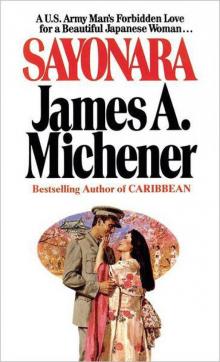 Sayonara
Sayonara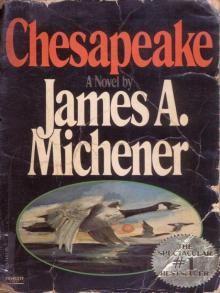 Chesapeake
Chesapeake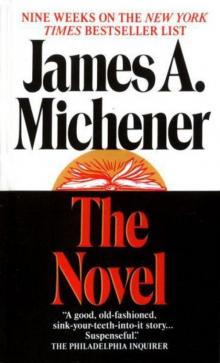 The Novel
The Novel Rascals in Paradise
Rascals in Paradise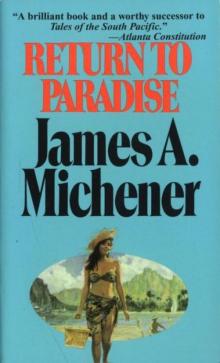 Return to Paradise
Return to Paradise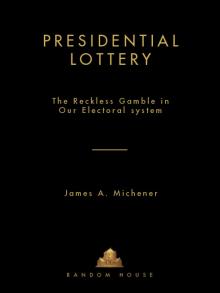 Presidential Lottery: The Reckless Gamble in Our Electoral System
Presidential Lottery: The Reckless Gamble in Our Electoral System The Source
The Source Poland
Poland Space
Space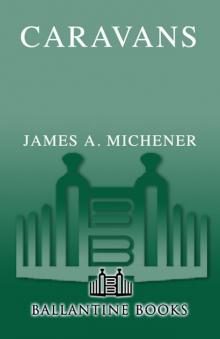 Caravans
Caravans Creatures of the Kingdom: Stories of Animals and Nature
Creatures of the Kingdom: Stories of Animals and Nature Iberia
Iberia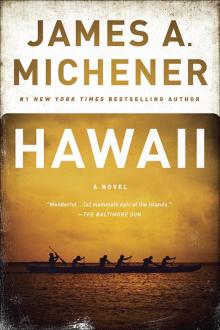 Hawaii
Hawaii The Watermen: Selections From Chesapeake
The Watermen: Selections From Chesapeake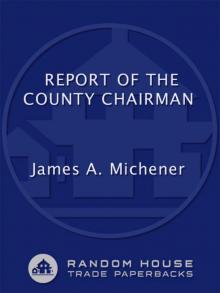 Report of the County Chairman
Report of the County Chairman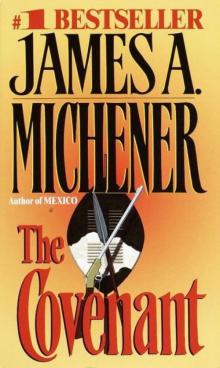 The Covenant
The Covenant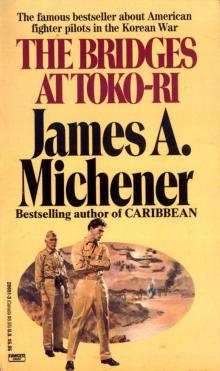 The Bridges at Toko-ri
The Bridges at Toko-ri Matecumbe
Matecumbe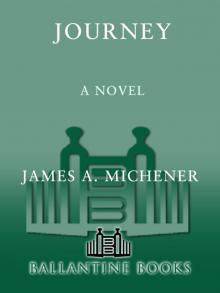 Journey: A Novel
Journey: A Novel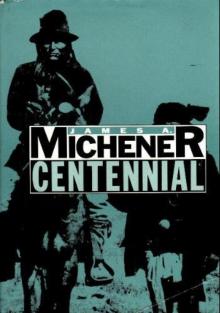 Centennial
Centennial Sports in America
Sports in America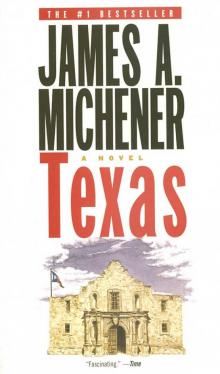 Texas
Texas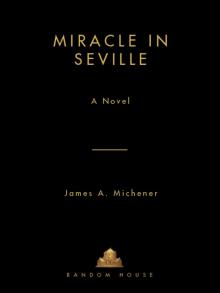 Miracle in Seville
Miracle in Seville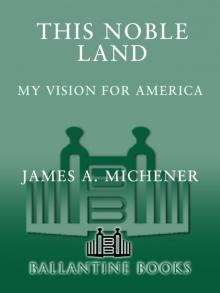 This Noble Land: My Vision for America
This Noble Land: My Vision for America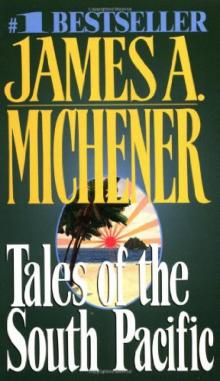 Tales of the South Pacific
Tales of the South Pacific Bridges at Toko-Ri
Bridges at Toko-Ri Space: A Novel
Space: A Novel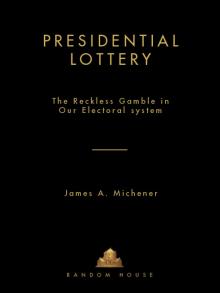 Presidential Lottery
Presidential Lottery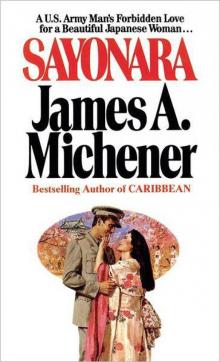 Sayonara: A Novel
Sayonara: A Novel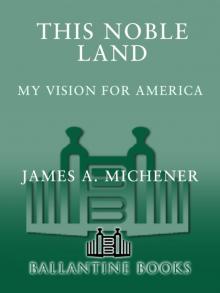 This Noble Land
This Noble Land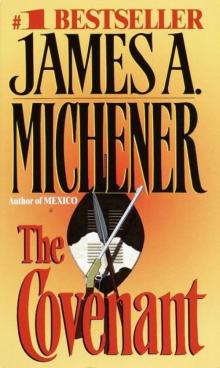 The Covenant: A Novel
The Covenant: A Novel Miracle in Seville: A Novel
Miracle in Seville: A Novel The Bridge at Andau
The Bridge at Andau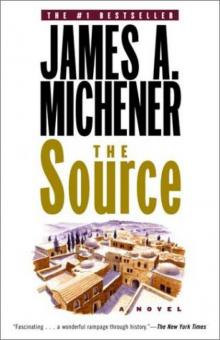 Source
Source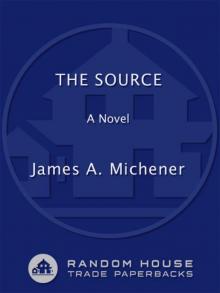 The Source: A Novel
The Source: A Novel Journey
Journey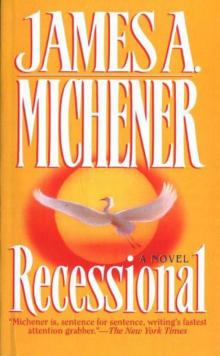 Recessional: A Novel
Recessional: A Novel Legacy: A Novel
Legacy: A Novel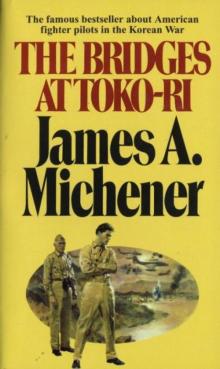 The Bridges at Toko-Ri: A Novel
The Bridges at Toko-Ri: A Novel Poland: A Novel
Poland: A Novel